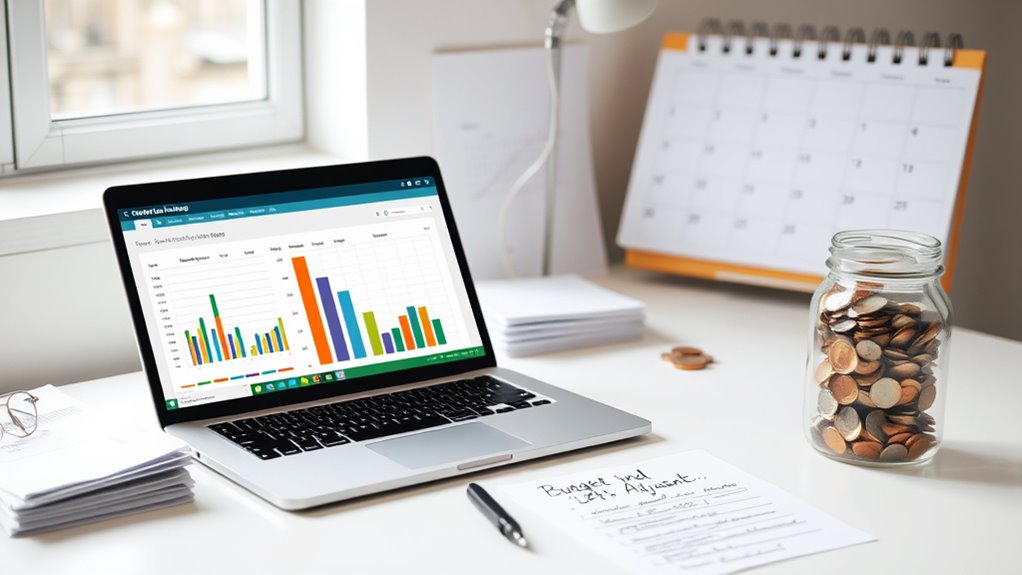To keep your budget simple, start by tracking all your income and expenses so you know exactly where your money goes. Set realistic limits for each spending category, like food and entertainment, based on your total income. Regularly review your spending to catch waste and stay on track. Prioritize saving and paying off debt, adjusting your budget when needed. Keep your goals in mind, and you’ll find it easier to stay motivated—learn more to master your money.
Key Takeaways
- Track all income and categorize expenses to understand where your money goes.
- Set realistic spending limits for each category based on your total income.
- Use budgeting tools or apps to monitor spending regularly and stay accountable.
- Prioritize saving and paying off high-interest debts to improve financial health.
- Review and adjust your budget periodically to accommodate changes and keep motivated.
Understanding Your Income and Expenses

To get a clear picture of your financial situation, you need to understand both your income and expenses. Start with bank account management by tracking all your income sources, such as paychecks, side jobs, or passive income. Once you know what’s coming in, focus on expense categorization. Break down your spending into categories like rent, groceries, transportation, and entertainment. This helps you see where your money goes each month. Use bank statements or budgeting apps to record these expenses accurately. By regularly reviewing your income and expenses, you gain insight into your financial health. This awareness is essential for making informed decisions and creating a realistic budget that aligns with your financial goals. Additionally, understanding financial literacy can empower you to make smarter money choices and improve your overall budgeting skills.
Setting Realistic Spending Limits

Once you’ve identified your income and expenses, the next step is setting realistic spending limits. To do this, categorize your expenses into clear groups like housing, food, transportation, and entertainment. For frugal living, aim to keep each category within a sensible limit that aligns with your total income. Be honest about your spending habits and avoid overestimating what you can cut back on. Set practical boundaries that challenge you but are achievable, preventing feelings of deprivation. Remember, these limits are not set in stone; they should reflect your current financial situation while encouraging smarter choices. Incorporating budgeting strategies can help you stay on track and make adjustments as needed. By establishing realistic spending limits, you create a solid foundation for maintaining control over your money and building healthy financial habits.
Tracking Your Spending Regularly

Tracking your spending regularly is essential for staying on top of your budget and making informed financial decisions. By monitoring where your money goes, you can identify spending patterns and adjust as needed. Use tools like cash envelopes to physically separate funds for different categories, making it easier to see when you’re overspending. Financial apps are also helpful for quick, automatic tracking; many sync with your bank accounts and categorize expenses. To stay consistent, consider setting aside a few minutes daily or weekly to review your transactions. Keep an eye on:
- Cash envelope balances
- Recent receipts
- Bank and credit card statements
- Spending categories in apps
- Budget goals progress
Regular tracking helps you stay accountable and guarantees your spending aligns with your financial goals. Being aware of spoilage signs in lemon juice can also help you avoid wasting money on spoiled products, ensuring your grocery expenses stay within budget.
Prioritizing Savings and Debt Payments

Prioritizing savings and debt payments guarantees your financial stability and progress toward your goals. Start by building an emergency fund that covers three to six months of living expenses—this safety net protects you from unexpected setbacks. Once your emergency fund is in place, focus on paying down high-interest debts first, like credit cards, to reduce overall costs. Simultaneously, allocate a portion of your income toward your financial goals, whether saving for a house, education, or future investments. Consistently emphasizing these payments ensures you’re making steady progress and avoiding costly interest. Remember, balancing debt repayment and savings is key to achieving long-term financial security and reaching your dreams. Staying aware of your financial risks and managing them wisely can further support your journey. Stay committed, and you’ll see your goals become reality.
Adjusting Your Budget as Needed

To keep your budget on track, you need to observe your spending regularly. Be ready to make adjustments when you encounter unexpected expenses or changes in income. Staying flexible ensures your budget remains realistic and effective. Using cookie preferences to monitor your online activity can help you understand your spending habits better.
Monitor Spending Regularly
Are you regularly reviewing your spending to stay on track? Monitoring your expenses helps you identify patterns and adjust your budget accordingly. Keep an eye on your credit card management to avoid overspending and guarantee you’re not exceeding your limits. Regularly checking your bank statements also reveals your shopping habits, showing where your money goes. To stay organized, consider:
- Tracking every purchase, big or small
- Comparing your spending to your budget goals
- Identifying unnecessary expenses
- Adjusting your spending habits if needed
- Using apps or tools for easy monitoring
Incorporating a variety of colors on the plate can enhance nutrient intake and make your breakfast more appealing. This practice keeps you accountable and aware of your financial health. By staying consistent, you’ll make smarter choices, prevent debt, and keep your financial goals within reach. Regular monitoring is key to a successful, sustainable budget.
Flexibility for Unexpected Expenses
Unexpected expenses can disrupt your budget, so maintaining flexibility is vital. Having an emergency fund allows you to cover surprises without derailing your finances. When unexpected costs arise, adjust your budget by reallocating funds from less urgent categories or using your emergency savings if necessary. Flexible spending means you don’t have to be rigid; it lets you adapt to life’s surprises without stress. Regularly review your budget so you can identify areas where you can cut back temporarily. Additionally, understanding projector contrast ratio can help you choose the right equipment to avoid costly mistakes or upgrades later. This approach helps you stay on track while handling surprises efficiently. Remember, the key is to be proactive and willing to tweak your spending plan when needed, ensuring you’re prepared for whatever unexpected expenses come your way.
Staying Motivated and Sticking to Your Plan

Staying motivated and sticking to your budget plan can be challenging, but understanding what drives your commitment makes all the difference. To stay on track, celebrate milestones like paying off a debt or saving a specific amount. Find accountability partners who can support and encourage you along the way. Keep your goals visible to remind yourself why you started. Track your progress regularly to see how far you’ve come. Adjust your plan if needed, but stay focused on your long-term objectives. Remember, persistence is key. By celebrating small wins, seeking accountability, and staying committed, you’ll build confidence and make budgeting a sustainable habit. These strategies keep you motivated and ensure your plan becomes part of your lifestyle. Additionally, incorporating healthy habits like breakfast delivery can boost your energy and motivation throughout your budgeting journey.
Frequently Asked Questions
How Often Should I Review and Update My Budget?
You should review your budget at least once a month, following a consistent monthly review schedule. Regular financial check-ins help you stay on track, identify overspending, and adapt for any income changes. Set a specific date each month to evaluate your expenses and savings. This routine keeps your financial goals in focus, ensures you’re aware of your progress, and helps you make informed decisions about your money management.
What Tools or Apps Are Best for Budgeting?
You should try budgeting apps like Mint, YNAB, or PocketGuard, which are user-friendly and help you track expenses effortlessly. These financial trackers sync with your bank accounts, making it easy to monitor your spending and stay on top of your budget. Using these tools regularly guarantees you’re aware of your financial health, helping you make smarter decisions and stay aligned with your financial goals.
How Can I Handle Unexpected Expenses?
Did you know 60% of people struggle with unexpected expenses? To handle them, focus on building an emergency fund that covers three to six months of expenses. Use expense tracking apps to monitor your spending and identify areas to save. When surprises hit, tap into your emergency fund instead of borrowing, and replenish it as soon as possible. Staying prepared helps you manage surprises without derailing your budget.
What’s the Best Way to Save for Short-Term Goals?
To save for short-term goals, you should create a dedicated savings fund, like an emergency fund, specifically for these targets. Set clear savings goals and determine a timeline for each. Automate regular contributions to this fund, so you stay consistent. Keep your savings accessible yet separate from your main account to avoid temptation. Tracking your progress helps keep you motivated and ensures you meet your savings goals efficiently.
How Do I Stay Disciplined When Temptations Arise?
When temptations hit, you stay disciplined by strengthening your impulse control and sticking to your budget plan. Create a reward system that allows small treats for meeting your savings goals, which keeps you motivated. Remind yourself of your long-term goals and avoid triggers that tempt you to overspend. Remember, practicing impulse control and rewarding progress helps you resist temptations and stay committed to your financial plan.
Conclusion
So there you have it—your foolproof, totally bulletproof plan to tame your finances. Follow these simple tips, and you’ll be swimming in savings—or at least not drowning in debt. Remember, budgeting isn’t about being perfect; it’s about pretending you have your act together. Stick with it, stay motivated, and soon you’ll be the envy of your broke friends. Who knew managing money could be this easy? Or at least, easier than winning the lottery!









